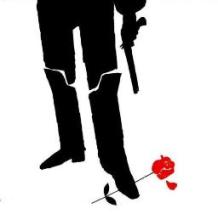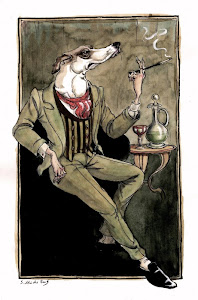 How things change! It's enough to make one laugh out loud.
How things change! It's enough to make one laugh out loud.When I was 10 years old the local long-haired street toughs in New Canaan, Connecticut persecuted me for wearing "preppy" Lacoste shirts and, I suspect, for being better-looking and more successful with the girls. I quickly got over it, bloodying a few noses along the way.
According to cutting-edge scientific research from Europe, however, sporting Lacoste all these years just might have helped me succeed at work and earn a higher salary--while those same New England ruffians today are probably stuck squeezing out anal glands in a suburban pet grooming salon.
Or so I like to imagine.
Scientists at Tilburg University in the Netherlands have just released findings from a unique sartorial experiment. According to The Economist newspaper:
"Rob Nelissen and Marijn Meijers of Tilburg University in the Netherlands examined people’s reactions to experimental stooges who were wearing clothes made by Lacoste and Tommy Hilfiger, two well-known brands that sell what they are pleased to refer to as designer clothing. As the two researchers show in a paper about to be published in Evolution and Human Behavior, such clothes do bring the benefits promised: co-operation from others, job recommendations and even the ability to collect more money when soliciting for charity...
The answer, Dr Nelissen and Dr Meijers suspect, is the same as why the peacock with the best tail gets all the girls. People react to designer labels as signals of underlying quality. Only the best can afford them..."
There are unique implications to this research. Scientists at the The Daily Finance interweb column took these findings and conducted their own comparative analysis. According to their experiments:
"In the midst of college admissions season, there's a useful comparison here: According to research from PayScale Inc., the median starting salary for a graduate of the University of Massachusetts Amherst is $47,000. The median starting salary for a graduate of Brown University--an Ivy League school--is $49,400. That's a difference of about 5.1%."
Compared to a 9% difference between wearing designer versus non-designer wear.
"In other words, wearing a Lacoste shirt to a job interview instead of a no-name shirt would appear to generate a higher starting salary than going to Brown instead of UMass. Another selling point? A Lacoste button-down costs $88 at Macy's, compared with annual tuition and fees of more than $40,000 per year at Brown -- versus about $12,000 at UMass."
Their conclusion?
"So if your kid suggests that you buy him a bunch of luxury clothing instead of sending him to an elite college, don't dismiss him as shallow and shortsighted. He just might be brilliant."
No doubt pompous trads, bolsheviks, hippies, puritans, and anti-Preppites everywhere are spluttering with indignation at this latest confirmation of human nature.
Don't be afraid. Become who you are.
http://www.economist.com/PrinterFriendly.cfm?story_id=18483423
http://www.dailyfinance.com/story/is-a-hermes-bag-a-better-investment-than-an-ivy-league-education/19903224/





















7 comments:
I love it, thank you for this posting.
Admiral, a facinating post. The downside of (ideologically commendable) education for all policies is a Bachelors degree is now the standard for even the lowliest entry level position, a Masters might give a candidate only a slight advantage in the quest for advancement and only the dizzy heights of a Doctorate really sets one head and shoulders above the rest. I've found Grannies pearls and a Chanel suit far more useful than any alumni organisation in betterment in the workplace. Reading this I think I'll add an Hermes bag and some Prada sunglasses to my birthday present list...
La Rochefoucauld said it best: Pour s'établir dans le monde, on fait tout ce que l'on peut pour y paraître établi.
A timely intervention in the Lacoste saga. It's a pity that they cannot sustain the same quality of manufacture under their many, many sequences of sourcing, or of style or sizing in the classic tennis shirt. That said, at the moment there is great liveliness in the brand, and conspicuously so at the outer margin of Lacoste Live, which operates a boutique in SoHo on Prince Street, with the "great collar's" original élan, for the youthful disposition. Even a gentleman of the world can take a flyer on their sneakers ..
I read this in the economist this morning and then saw your post in my google reader and must say that this holds true in the University setting as well. It is amazing how brand loyalty and identification can shape peoples preferences. Thanks for sharing.
There may be a flaw or two in this analysis. For example: when you're talking about "starting salary," I take it to mean the salary of undergrads who go directly into the workplace. My guess is that only the lowest tenth or so of the Brown class goes into the workplace, whereas the other 90 percent goes to professional (law or med) or graduate school. The cutoff is probably different at UMass, where, for example, only the top 25% may go on to further education (I am making these numbers up for discussion only). Thus, an analysis like this may be comparing the bottom ten percent of the Brown class to a much more representative UMass grad. A better indicator would be 25-year salary. Just saying that the situation could a lot more complex than suggested by your post -- I have no dog in this fight.
Peter Thiel: We’re in a Bubble and It’s Not the Internet. It’s Higher Education.
http://techcrunch.com/2011/04/10/peter-thiel-were-in-a-bubble-and-its-not-the-internet-its-higher-education/
Post a Comment